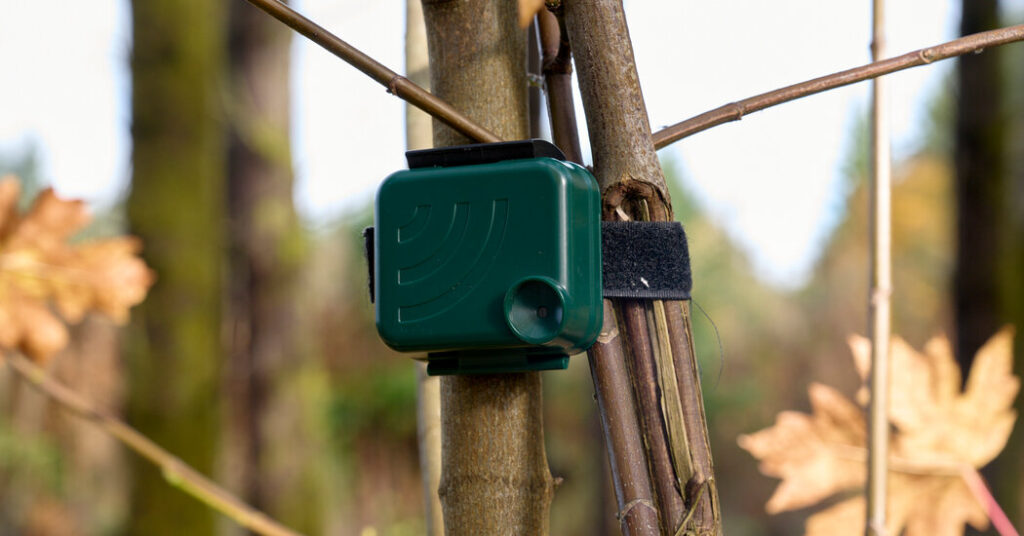50 States, 50 Fixes is a series about local solutions to environmental problems. A few more to come this year.
After joining Great Peninsula Conservancy, a nonprofit land trust outside Seattle, Adrian Wolf wanted to know what birds thought of the group’s forest restoration work.
Birds are invaluable indicators of ecological health. Their presence or absence can help to gauge the condition of restored habitats, where dense trees had been thinned to create space for other plants, or standing dead trees had been left in place for cavity-dependent species like woodpeckers.
But traditional bird counts can be expensive, inexact and take ages. Often, when people try to monitor the birds they hear or spot, their presence alone scares the birds off.
Mr. Wolf, the conservancy’s stewardship director, knew this well. He had spent hundreds of hours in the treetops of the Pacific Northwest during graduate school, watching how birds used old growth canopy. But the conservancy didn’t have the resources for that kind of monitoring.
So, in 2022, Mr. Wolf and a colleague secured funding from the Cornell Lab of Ornithology for a dozen small audio devices that they strapped to trees across several of the conservancy’s properties. The project has since grown to include six other partners: land trusts, tribes and county parks. Together, they are improving forest habitat and monitoring bird calls across 4,533 acres of protected land in western Washington; on rugged islands; in monoculture forests; along restored floodplains; and on land bouncing back from intense agricultural and timber use.
The Listen Up Collaborative, as the project came to be known, has collected more than 400,000 recordings from 92 study sites and is using artificial intelligence to discern bird calls. The data will help guide habitat restoration work, with the goal of drawing diverse animal species, mitigating fire risk and bolstering forests’ resilience in the face of climate change.Mr. Wolf likened the process to collecting “nature’s Yelp reviews.”
“With restoration practices, people go in there and do the work, but we don’t really assess how wildlife responds,” Mr. Wolf said. “If we understand how long animals take to respond to these forestry treatments, this could be entered into the recovery plans for certain species.”
Ecologists and foresters have long known that practices like thinning dense forests can draw birds.
But data from the collective’s audio recorders can replace anecdotal evidence with exacting specificity. The group is using software to identify and monitor 45 target species, including the Pacific wren, spotted towhee and chestnut-backed chickadee.
While the project is still in the early stages, the devices have already captured increased vocalizations from Swainson’s thrushes drawn to understory vegetation that grew after stands of Douglas fir and Red alder had been thinned.
“We humans have a very short life span compared to a forest,” said Carrie Clendaniel, preserve manager with the Jefferson Land Trust, one of the partners in the project. But birds, she said, “tell us in relatively short time frames if the habitat is improving for certain species that require more complex conditions, which also helps it to be more climate resilient.”
There are limits to what the audio monitors can do.
They cannot, for example, see birds: The silent flight of an owl would pass by undetected. Nor do they capture bird abundance, but instead birds’ presence or absence; the researchers operate under the assumption that if a bird is singing often, it’s likely declaring its territory to neighboring birds. The amount of data collected is also enormous, and the AI can make mistakes: Its findings need to be fact checked, a task that, in the case of the Listen Up Collaborative, often falls to volunteers as well as undergraduate and graduate students.
But Alison Styring, an ornithology professor at Evergreen State College, who has used the devices to research birds in the Malaysian part of Borneo and has advised Mr. Wolf on their use, said the technology has helped democratize fieldwork. “Local communities don’t have to be associated with a university or go through a lot of hoops to figure something out about what’s going on around them,” Dr. Styring said.
The devices, called AudioMoths, are tiny, roughly four square inches, and easy to use. Crucially, they’re also affordable, costing around $100 apiece, a boon for nonprofit groups and public agencies.
“By having these monitors out there, it can do work for us,” said Fawn Wagner, refuge manager for the Jamestown S’klallam Tribe, which is using the AudioMoths at sites along the Pacific Flyway, a major bird migratory route. “We can switch our priorities to help the species that are there or are using these habitats.”
Birds have suffered precipitous population drops in recent decades. A 2019 study calculated a loss of three billion birds in North America since 1970 because of habitat loss, pesticide use, window collisions and the ripple effects of an overheating planet. Over half of all forest birds from the Western part of the United States are also in decline, driven by habitat degradation and loss, making the health of remaining natural lands especially crucial.
“What we have left really has to function as well as possible,” said Gina King, conservation director of the Bainbridge Island Land Trust, which is part of the collective. “Here we’re taking actions that allow that to happen.”
Cara Buckley is a reporter on the climate team at The Times who focuses on people working toward climate solutions.
The post In Washington, Birds Are Giving ‘Yelp Reviews’ of Forest Restoration Work appeared first on New York Times.




